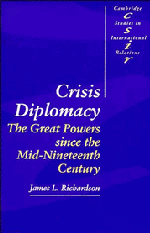3 - ‘Crisis management’ versus ‘crisis diplomacy’
Published online by Cambridge University Press: 03 May 2011
Summary
In view of the diversity of theoretical approaches to the study of crises there is a surprising degree of consensus in the discussion of ‘crisis management’ – an expression which came into use at the time of the Cuban missile crisis. It refers to a body of ideas which reflect the lessons of that crisis as perceived by Americans at that time. With minor variations these general principles have frequently been reaffirmed in the scholarly literature. One or other of the principles has occasionally been challenged by policy makers, but none has developed an alternative to the standard doctrine of crisis management.
The concept
The term was popularised by Robert McNamara's comment on the Cuban experience: ‘There is no longer any such thing as strategy, only crisis management.’ The term is often taken to mean the exercise of restraint in order to reduce the risk of war. However, this usage obscures the central problem confronting decision makers in nuclear-age crises – that each party seeks to pursue simultaneously two potentially incompatible goals: to prevail over the adversary, while at the same time avoiding nuclear war. ‘Crisis management’ must address the tension between the two goals, but this brings out the questionable character of the concept itself. The dilemmas of choice are glossed over by the use of the term ‘management’, with its overtones of technical rationality and efficiency.
- Type
- Chapter
- Information
- Crisis DiplomacyThe Great Powers since the Mid-Nineteenth Century, pp. 25 - 34Publisher: Cambridge University PressPrint publication year: 1994



